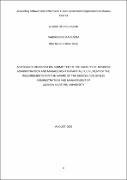Accounting software and performance in non-government organizations in Masaka district
Abstract
The study examined the Relationship between accounting software characteristics and performance in the NGOs, A case of DFCU bank guided by three research objectives; i) to examine the relationship between efficiency and performance at DFCU bank; ii) to examine the relationship between reliability and performance at DFCU bank and iii) to find the relationship between accuracy and performance.
Using a cross sectional design on a sample of 45 respondents, the study employed both self – Administered Questionnaires and interview guide and collected both Primary qualitative as well as quantitative data which was processed using SPSS Version (16).A descriptive research design was used with qualitative and quantitative research approaches.
Registering a response rate of 88.9%, the results of Pearson’s two tail statistic revealed that efficiency and reliability have a strong positive significant relationship with performance at DFCU bank with correlation coefficients of (r = 0.911, p = 0.000 and r = 0.833, p = 0.000 respectively) while accuracy with performance give a positive correlation coefficient of (r = 0.788 and p = 0.000). Relatedly, regression analysis revealed that reliability and accuracy positively affect performance with net contributions of 52.8% and 43.5% while efficiency contributes negatively to performance with – 1.2%
The researcher concluded that on the overall, accounting software accounts for 77% of the variation in performance at DFCU bank and that whereas reliability and accuracy positively predict performance, efficiency negatively predict the same. The research thus recommends that consorted efforts to be put in improving efficiency of staff through continuous trainings and retooling, review and approval of data inputs and enforcement of policy framework on technological advancement in the organization coupled with ensuring a smooth and efficient process so as to propel satisfactory levels of performance


